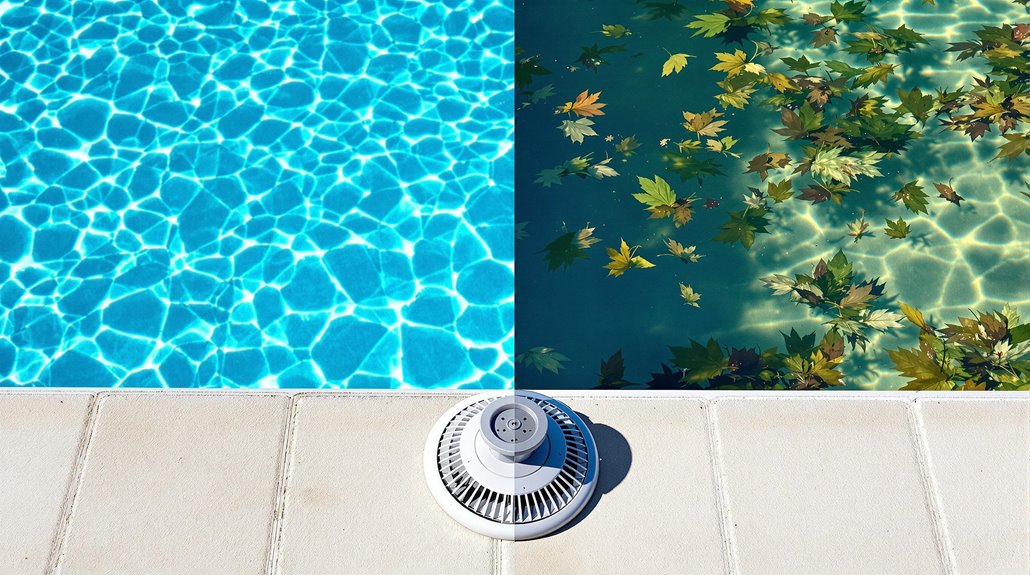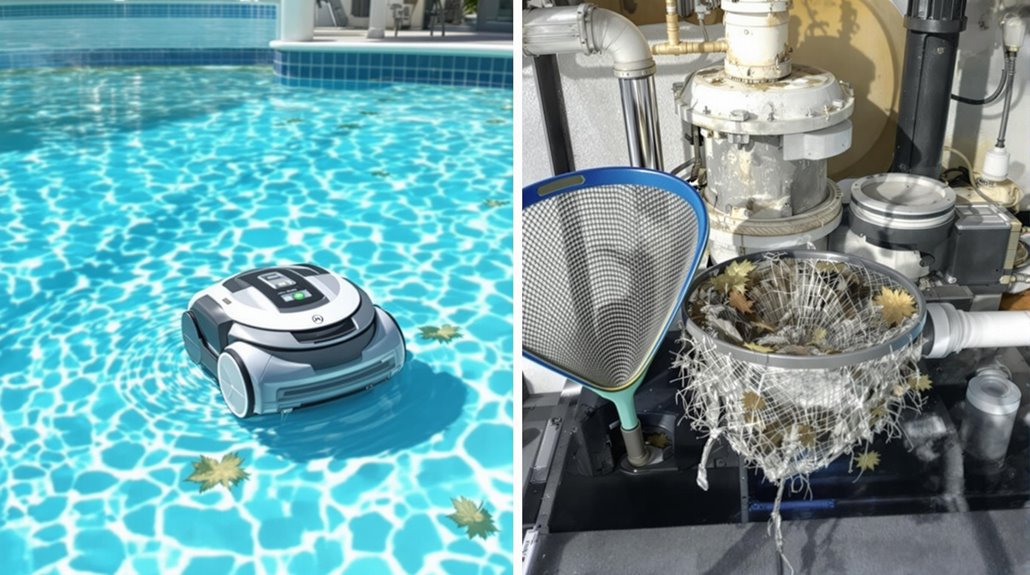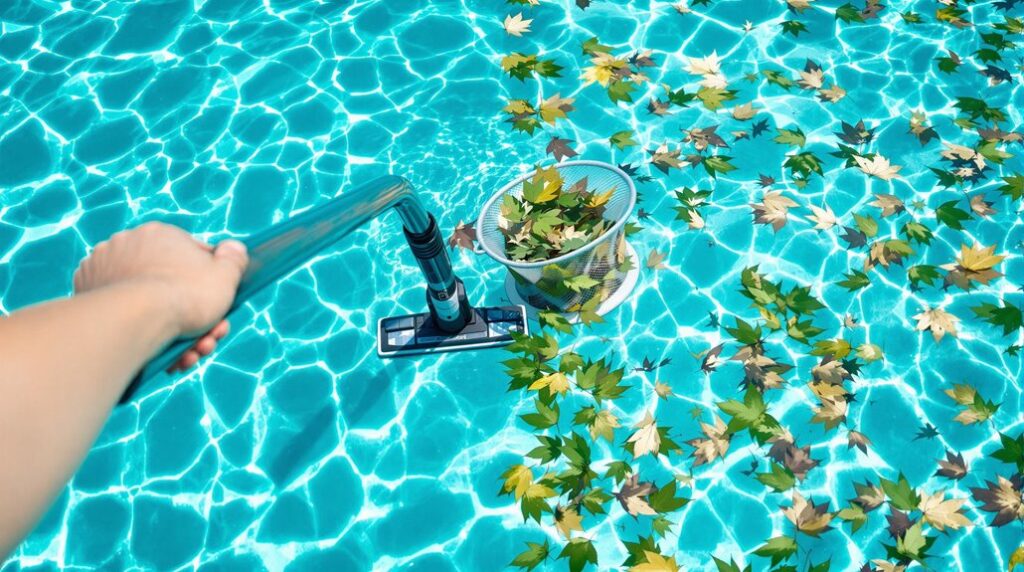Regular skimming and vacuuming are essential because debris directly impacts your pool’s chemistry and safety. Whenever organic matter decomposes, it releases acids that alter pH levels and reduces chlorine effectiveness, leading to harmful bacterial growth and potential health risks. Debris also blocks UV exposure, creating ideal conditions for algae blooms that can cause respiratory issues. Maintaining these basic cleaning practices protects both your equipment investment and swimmers’ well-being, setting the foundation for a properly maintained pool.
The Science Behind Debris and Water Chemistry

Anyone maintaining a pool needs to understand how debris affects water chemistry and clarity. Whenever organic matter such as leaves and insects decompose in your pool, they release acids that raise CO₂ levels and lower pH. This process disrupts chlorine’s effectiveness, since it binds to the debris instead of sanitizing your water. Algae prevention methods start with proper debris removal to maintain optimal water chemistry. Testing pH balance levels regularly ensures debris hasn’t disrupted your pool’s chemistry. Pool safety guidelines require maintaining proper chemical balance year-round to protect swimmers’ health.
Your pool’s chemical balance takes a direct hit when debris accumulates. As particles block sunlight penetration, they slow down disinfection and create perfect conditions for algae growth. The algae then feed on nutrients from decaying debris, creating a cycle that throws off oxygen levels. You’ll find yourself constantly rebalancing chemicals if you don’t remove debris promptly. Plus, the particulate matter reduces UV exposure throughout the water, making it harder for your sanitizers to work effectively. Cloudy water conditions can persist until proper debris removal and chemical balancing are performed consistently. Daily surface skimming helps maintain pristine water quality and prevents long-term chemical imbalances.
Health and Safety Benefits of Regular Pool Maintenance
Although maintaining proper pool chemistry might seem complex, regular maintenance provides essential health and safety benefits for swimmers. You’ll protect yourself and others from harmful bacteria such as E. coli through consistent shock treatments and proper sanitizer levels. By keeping pH balanced between 7.2 and 7.8, you’ll prevent skin and eye irritation while ensuring your sanitizers work effectively. Overnight shocking helps eliminate contaminants while preventing swimmer exposure to high chemical levels.
Your weekly maintenance routine, including brushing walls and vacuuming, prevents dangerous algae blooms that can cause respiratory issues. Watch for unexplained water loss, as this could indicate a leak compromising your pool’s chemical balance. As you maintain proper alkalinity (80-120 ppm) and calcium hardness (200-400 ppm), you’re not just protecting your equipment – you’re creating a stable environment that inhibits bacterial growth. A properly functioning pump motor is crucial for efficient water circulation and filtration. Maintaining a functional heater system helps prevent moisture-related bacterial growth in cooler temperatures. Regular water testing helps you catch potential health threats before they become serious problems. Starting your pool opening checklist early in the season ensures you’ll have a safe swimming environment from day one.
Protecting Your Pool Equipment Investment

Three essential strategies can help protect your significant pool equipment investment: thorough protection plans, proper physical safeguards, and consistent maintenance routines.
You’ll want to start with an extended warranty that covers mechanical failures and electrical issues, eliminating repair fees while providing quick claim resolution. Install surge protectors such as the Intermatic PS3000 SPD to shield your equipment from damaging voltage spikes, along with an EH40 Timer to prevent pump burnout.
Don’t forget to house your equipment in weather-resistant enclosures to prevent corrosion and chemical accidents. Regular maintenance, including skimming and vacuuming, keeps your system running efficiently by preventing debris from clogging filters and straining pumps. This all-encompassing approach reduces energy costs, extends equipment life, and maximizes your investment’s return. Following proper filter maintenance steps will significantly increase the longevity of your pool’s filtration system. Keeping your pool tiles clean helps prevent calcium buildup that can strain your equipment and affect water quality.
Best Practices for Effective Skimming and Vacuuming
Effective pool skimming starts with proper preparation and proven techniques that’ll improve your debris removal efforts. Before you begin, remove large debris with your pool net and verify your skimmer’s components are in good working order. You’ll want to adjust the float assembly to maintain ideal water levels for efficient skimming.
To achieve the best results, use overlapping patterns similar to mowing your lawn, and focus on edges where debris tends to collect. Move your skimmer with steady, controlled motions to avoid stirring up settled particles. After skimming, clean your basket immediately to maintain strong suction. For improved performance, consider using skimmer socks to catch smaller particles, and keep your equipment stored in shaded areas to prevent damage from UV exposure.
Frequently Asked Questions
How Often Should I Replace My Pool Skimmer and Vacuum Heads?
Replace skimmer basket annually. Replace vacuum head every 2-3 years. Replace both sooner if damaged or underperforming.
Can I Vacuum My Pool During a Rainstorm?
Never vacuum pools during rainstorms. Lightning poses electrocution hazards, visibility is reduced, and continuous rain adds new debris. Wait for clear weather to clean effectively.
What’s the Difference Between Manual and Automatic Pool Vacuum Settings?
Manual settings require user control of vacuum movements. Automatic settings operate independently using preset cleaning patterns.
Should I Vacuum My Pool Before or After Adding Chemicals?
Vacuum before adding chemicals to remove debris. Wait 24 hours after chemical treatments before vacuuming again to ensure proper chemical distribution.
Why Does My Vacuum Lose Suction When Skimming Deeper Areas?
Vacuum suction decreases in deeper areas due to extended hose length reducing pressure and increased water depth creating resistance. Higher pump power compensates for these effects.

